Compound sentence 和complex sentence的区别及英语写作中常见的错误
- 格式:doc
- 大小:37.50 KB
- 文档页数:8
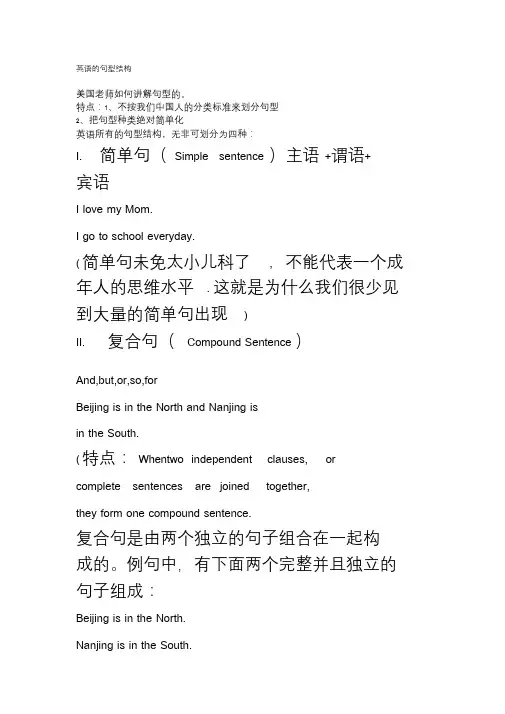
英语的句型结构美国老师如何讲解句型的。
特点:1、不按我们中国人的分类标准来划分句型2、把句型种类绝对简单化英语所有的句型结构,无非可划分为四种:I. 简单句(Simple sentence )主语+谓语+宾语I love my Mom.I go to school everyday.( 简单句未免太小儿科了, 不能代表一个成年人的思维水平. 这就是为什么我们很少见到大量的简单句出现)II. 复合句(Compound Sentence )And,but,or,so,forBeijing is in the North and Nanjing isin the South.( 特点:Whentwo independent clauses, or complete sentences are joined together,they form one compound sentence.复合句是由两个独立的句子组合在一起构成的。
例句中,有下面两个完整并且独立的句子组成:Beijing is in the North.Nanjing is in the South.III. 复杂句(Complex Sentence )Myuncle, who i s seventy years old, workson a farm.( 特点:Whenan independent clause and a dependent clause are joined together;they form one complex sentence.复合句是由一个独立的句子加一个从句构成的。
)China is a country that its history isvery long.China is a country. ( 独立句子)That its history is very long ( 从句)IV. 复杂句+复合句(Compound sentence+ Complex sentence )Studying English is important because alot of jobs need people know English; andlearning English helpspeople understand other country ’sculture.整体看,这是一个由moreover 连接的复合句,前后两句都在谈论学英语的重要性,两个独立完整的句子。
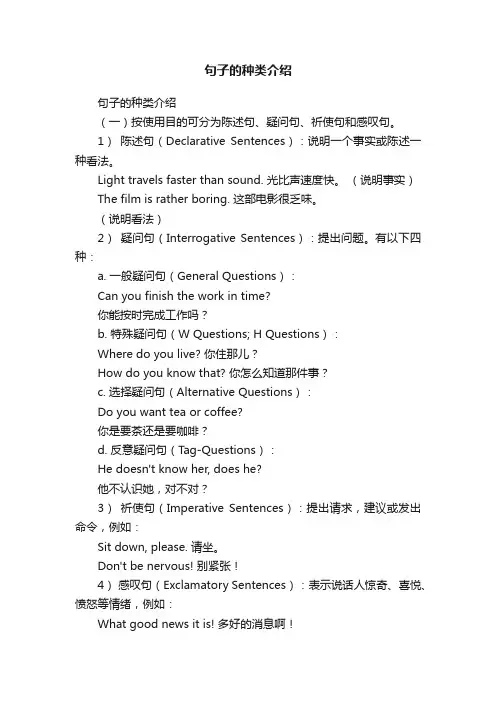
句子的种类介绍句子的种类介绍(一)按使用目的可分为陈述句、疑问句、祈使句和感叹句。
1)陈述句(Declarative Sentences):说明一个事实或陈述一种看法。
Light travels faster than sound. 光比声速度快。
(说明事实)The film is rather boring. 这部电影很乏味。
(说明看法)2)疑问句(Interrogative Sentences):提出问题。
有以下四种:a. 一般疑问句(General Questions):Can you finish the work in time?你能按时完成工作吗?b. 特殊疑问句(W Questions; H Questions):Where do you live? 你住那儿?How do you know that? 你怎么知道那件事?c. 选择疑问句(Alternative Questions):Do you want tea or coffee?你是要茶还是要咖啡?d. 反意疑问句(Tag-Questions):He doesn't know her, does he?他不认识她,对不对?3)祈使句(Imperative Sentences):提出请求,建议或发出命令,例如:Sit down, please. 请坐。
Don't be nervous! 别紧张!4)感叹句(Exclamatory Sentences):表示说话人惊奇、喜悦、愤怒等情绪,例如:What good news it is! 多好的消息啊!(二)句子按其结构可以分为以下三类:1)简单句(Simple Sentences):只包含一个主谓结构句子叫简单句,例如:She is fond of collecting stamps. 她喜欢集邮。
(主) (谓)2)并列句(Compound Sentences):包含两个或两个以上主谓结构的句子叫并列句,句与句之间通常用并列连词或分号来连接,例如:The food was good, but he had little appetite.(主) (谓) (主)(谓)食物很精美,但他却没什么胃口。
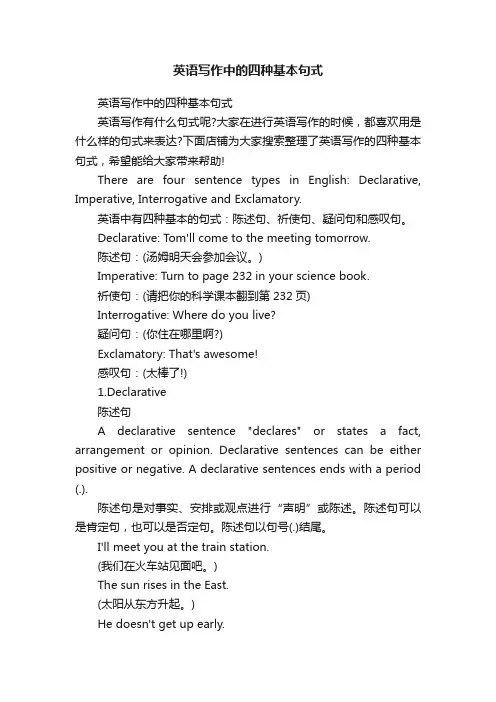
英语写作中的四种基本句式英语写作中的四种基本句式英语写作有什么句式呢?大家在进行英语写作的时候,都喜欢用是什么样的句式来表达?下面店铺为大家搜索整理了英语写作的四种基本句式,希望能给大家带来帮助!There are four sentence types in English: Declarative, Imperative, Interrogative and Exclamatory.英语中有四种基本的句式:陈述句、祈使句、疑问句和感叹句。
Declarative: Tom'll come to the meeting tomorrow.陈述句:(汤姆明天会参加会议。
)Imperative: Turn to page 232 in your science book.祈使句:(请把你的科学课本翻到第232页)Interrogative: Where do you live?疑问句:(你住在哪里啊?)Exclamatory: That's awesome!感叹句:(太棒了!)1.Declarative陈述句A declarative sentence "declares" or states a fact, arrangement or opinion. Declarative sentences can be either positive or negative. A declarative sentences ends with a period (.).陈述句是对事实、安排或观点进行“声明”或陈述。
陈述句可以是肯定句,也可以是否定句。
陈述句以句号(.)结尾。
I'll meet you at the train station.(我们在火车站见面吧。
)The sun rises in the East.(太阳从东方升起。
)He doesn't get up early.(他不早起。
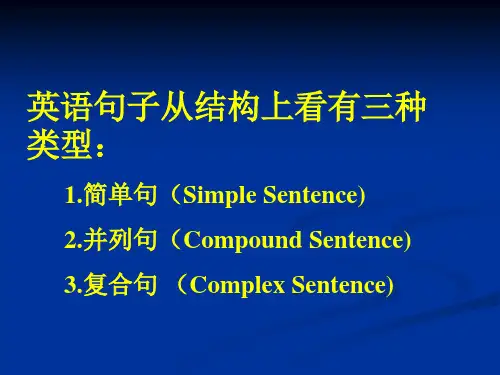
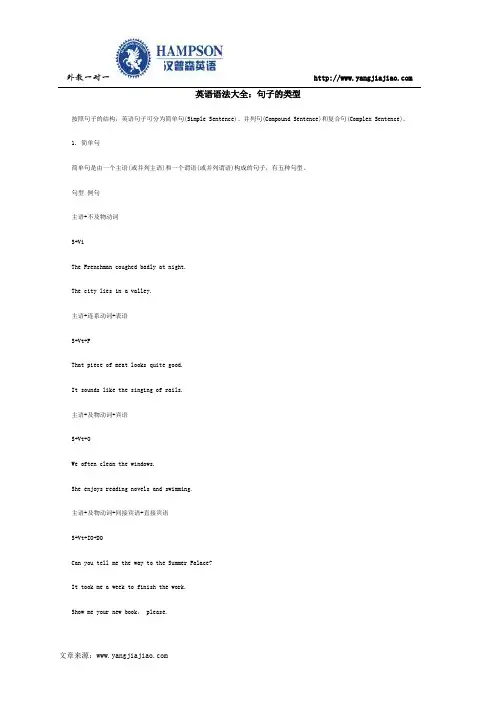
外教一对一英语语法大全:句子的类型按照句子的结构,英语句子可分为简单句(Simple Sentence)、并列句(Compound Sentence)和复合句(Complex Sentence)。
1. 简单句简单句是由一个主语(或并列主语)和一个谓语(或并列谓语)构成的句子,有五种句型。
句型例句主语+不及物动词S+ViThe Frenchman coughed badly at night.The city lies in a valley.主语+连系动词+表语S+Vt+PThat piece of meat looks quite good.It sounds like the singing of rails.主语+及物动词+宾语S+Vt+OWe often clean the windows.She enjoys reading novels and swimming.主语+及物动词+间接宾语+直接宾语S+Vt+IO+DOCan you tell me the way to the Summer Palace?It took me a week to finish the work.Show me your new book, please.外教一对一 主语+及物动词+宾语+宾语补足语S +Vt+O+CWe call him Li Ming.We keep our classroom clean and tidy.I hear someone singing in the next room.特别提示:so, neither或nor引导的倒装句也属于简单句。
例如:He can play the piano. So can I. 他会弹钢琴,我也会。
Mike didn’t go swimming yesterday. Neither/Nor did Tom. 迈克昨天没有去游泳,汤姆也没去。
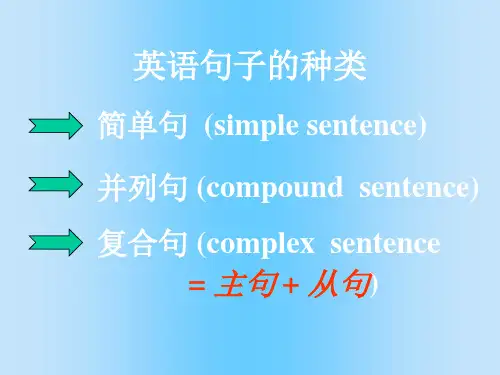
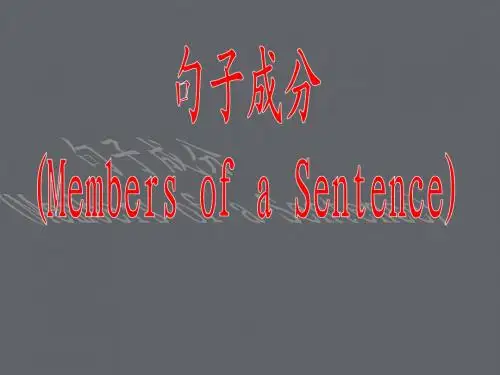
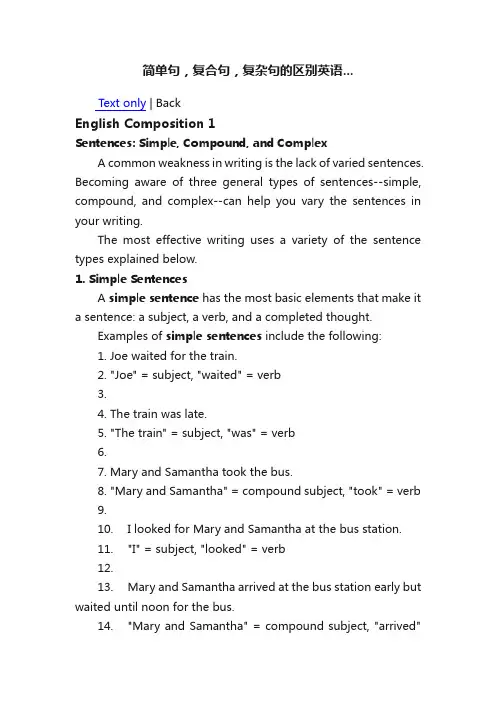
简单句,复合句,复杂句的区别英语...Text only | BackEnglish Composition 1Sentences: Simple, Compound, and ComplexA common weakness in writing is the lack of varied sentences. Becoming aware of three general types of sentences--simple, compound, and complex--can help you vary the sentences in your writing.The most effective writing uses a variety of the sentence types explained below.1. Simple SentencesA simple sentence has the most basic elements that make it a sentence: a subject, a verb, and a completed thought.Examples of simple sentences include the following:1.Joe waited for the train.2."Joe" = subject, "waited" = verb3.4.The train was late.5."The train" = subject, "was" = verb6.7.Mary and Samantha took the bus.8."Mary and Samantha" = compound subject, "took" = verb9.10.I looked for Mary and Samantha at the bus station.11."I" = subject, "looked" = verb12.13.Mary and Samantha arrived at the bus station early but waited until noon for the bus.14."Mary and Samantha" = compound subject, "arrived"and "waited" = compound verbTip: If you use many simple sentences in an essay, you should consider revising some of the sentences into compound or complex sentences (explained below).The use of compound subjects, compound verbs, prepositional phrases (such as "at the bus station"), and other elements help lengthen simple sentences, but simple sentences often are short. The use of too many simple sentences can make writing "choppy" and can prevent the writing from flowing smoothly.A simple sentence can also be referred to as an independent clause. It is referred to as "independent" because, while it might be part of a compound or complex sentence, it can also stand by itself as a complete sentence.2. Compound SentencesA compound sentence refers to a sentence made up of two independent clauses (or complete sentences) connected to one another with a coordinating conjunction. Coordinating conjunctions are easy to remember if you think of the words "FAN BOYS":•F or•A nd•N or•B ut•O r•Y et•S oExamples of compound sentences include the following:1.Joe waited for the train, but the train was late.2.3.I looked for Mary and Samantha at the bus station, but they arrived at the station before noon and left on the bus before I arrived.4.5.Mary and Samantha arrived at the bus station before noon, and they left on the bus before I arrived.6.7.Mary and Samantha left on the bus before I arrived, so I did not see them at the bus station.Tip: If you rely heavily on compound sentences in an essay, you should consider revising some of them into complex sentences (explained below).Coordinating conjunctions are useful for connecting sentences, but compound sentences often are overused. While coordinating conjunctions can indicate some type of relationship between the two independent clauses in the sentence, they sometimes do not indicate much of a relationship. The word "and," for example, only adds one independent clause to another, without indicating how the two parts of a sentence are logically related. Too many compound sentences that use "and" can weaken writing.Clearer and more specific relationships can be established through the use of complex sentences.3. Complex SentencesA complex sentence is made up of an independent clause and one or more dependent clauses connected to it. Adependent clause is similar to an independent clause, or complete sentence, but it lacks one of the elements that would make it a complete sentence.Examples of dependent clauses include the following:•because Mary and Samantha arrived at the bus station before noon•while he waited at the train station•after they left on the busDependent clauses such as those above cannot stand alone as a sentence, but they can be added to an independent clause to form a complex sentence.Dependent clauses begin with subordinating conjunctions. Below are some of the most common subordinating conjunctions:•after•although•as•because•before•even though•if•since•though•unless•until•when•whenever•whereas•wherever•whileA complex sentence joins an independent clause with one ormore dependent clauses.The dependent clauses can go first in the sentence, followed by the independent clause, as in the following:Tip: When the dependent clause comes first, a comma should be used to separate the two clauses.1.Because Mary and Samantha arrived at the bus station before noon, I did not see them at the station.2.While he waited at the train station, Joe realized that the train was late.3.After they left on the bus, Mary and Samantha realized that Joe was waiting at the train station.Conversely, the independent clauses can go first in the sentence, followed by the dependent clause, as in the following: Tip: When the independent clause comes first, a comma should not be used to separate the two clauses.1.I did not see them at the station because Mary and Samantha arrived at the bus station before noon.2.Joe realized that the train was late while he waited at the train station.3.Mary and Samantha realized that Joe was waiting at the train station after they left on the bus.Complex sentences are often more effective than compound sentences because a complex sentence indicates clearer and more specific relationships between the main parts of the sentence. The word "before," for instance, tells readers that one thing occurs before another. A word such as "although" conveys a more complex relationship than a word such as "and" conveys.The term periodic sentence is used to refer to a complex sentence beginning with a dependent clause and ending with an independent clause, as in "While he waited at the train station,Joe realized that the train was late."Periodic sentences can be especially effective because the completed thought occurs at the end of it, so the first part of the sentence can build up to the meaning that comes at the end. Beginning Sentences with "And" or "Because"Should you begin a sentence with "and" or "but" (or one of the other coordinating conjunctions)?The short answer is "no." You should avoid beginning a sentence with "and," "or," "but," or the other coordinating conjunctions. These words generally are used to join together parts of a sentence, not to begin a new sentence.However, such sentences can be used effectively. Because sentences beginning with these words stand out, they are sometimes used for emphasis. If you use sentences beginning with one of the coordinating conjunctions, you should use these sentences sparingly and carefully.Should you begin a sentence with "because"?There is nothing wrong with beginning a sentence with "because."Perhaps some students are told not to begin a sentence with "because" to avoid sentence fragments (something like "Because Mary and Samantha arrived at the bus station before noon" is a sentence fragment), but it is perfectly acceptable to begin a sentence with "because" as long as the sentence is complete (as in "Because Mary and Samantha arrived at the bus station before noon, I did not see them at the station.")Watch It!Simple, Compound, and Complex Sentences from theWriting Center at Texas A & M。
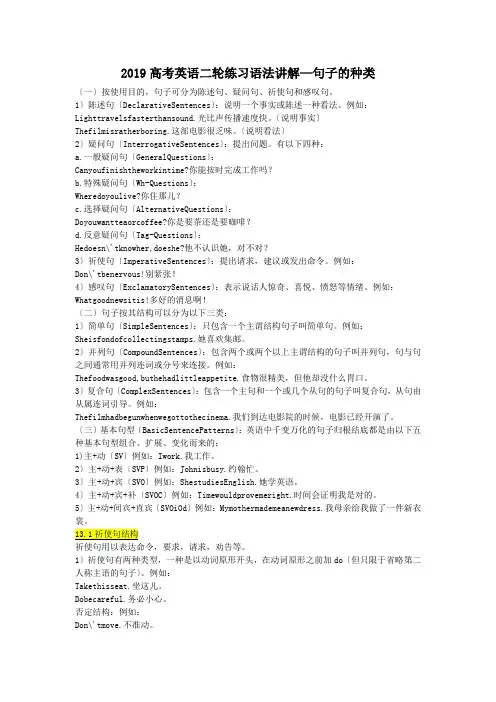
2019高考英语二轮练习语法讲解—句子的种类〔一〕按使用目的,句子可分为陈述句、疑问句、祈使句和感叹句。
1〕陈述句〔DeclarativeSentences〕:说明一个事实或陈述一种看法。
例如:Lighttravelsfasterthansound.光比声传播速度快。
〔说明事实〕Thefilmisratherboring.这部电影很乏味。
〔说明看法〕2〕疑问句〔InterrogativeSentences〕:提出问题。
有以下四种:a.一般疑问句〔GeneralQuestions〕:Canyoufinishtheworkintime?你能按时完成工作吗?b.特殊疑问句〔Wh-Questions〕:Wheredoyoulive?你住那儿?c.选择疑问句〔AlternativeQuestions〕:Doyouwantteaorcoffee?你是要茶还是要咖啡?d.反意疑问句〔Tag-Questions〕:Hedoesn\'tknowher,doeshe?他不认识她,对不对?3〕祈使句〔ImperativeSentences〕:提出请求,建议或发出命令。
例如:Don\'tbenervous!别紧张!4〕感叹句〔ExclamatorySentences〕:表示说话人惊奇、喜悦、愤怒等情绪。
例如:Whatgoodnewsitis!多好的消息啊!〔二〕句子按其结构可以分为以下三类:1〕简单句〔SimpleSentences〕:只包含一个主谓结构句子叫简单句。
例如:Sheisfondofcollectingstamps.她喜欢集邮。
2〕并列句〔CompoundSentences〕:包含两个或两个以上主谓结构的句子叫并列句,句与句之间通常用并列连词或分号来连接。
例如:Thefoodwasgood,buthehadlittleappetite.食物很精美,但他却没什么胃口。
3〕复合句〔ComplexSentences〕:包含一个主句和一个或几个从句的句子叫复合句,从句由从属连词引导。
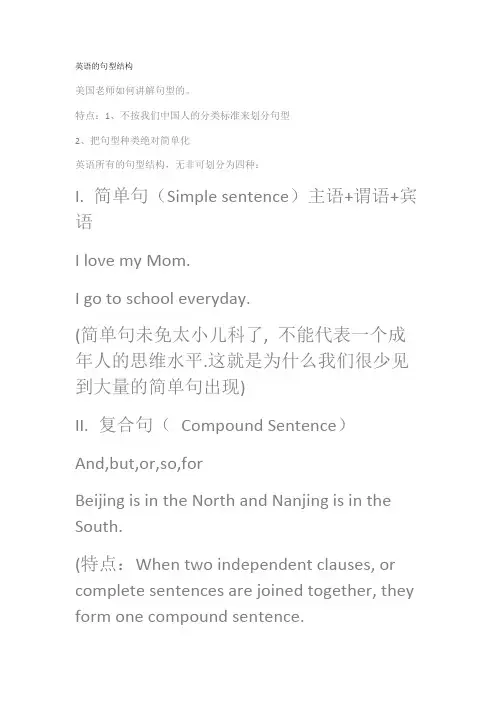
英语的句型结构美国老师如何讲解句型的。
特点:1、不按我们中国人的分类标准来划分句型2、把句型种类绝对简单化英语所有的句型结构,无非可划分为四种:I. 简单句(Simple sentence)主语+谓语+宾语I love my Mom.I go to school everyday.(简单句未免太小儿科了, 不能代表一个成年人的思维水平.这就是为什么我们很少见到大量的简单句出现)II. 复合句(Compound Sentence)And,but,or,so,forBeijing is in the North and Nanjing is in the South.(特点:When two independent clauses, or complete sentences are joined together, they form one compound sentence.复合句是由两个独立的句子组合在一起构成的。
例句中,有下面两个完整并且独立的句子组成:Beijing is in the North.Nanjing is in the South.III. 复杂句(Complex Sentence)My uncle, who is seventy years old, works on a farm.(特点:When an independent clause and a dependent clause are joined together; they form one complex sentence.复合句是由一个独立的句子加一个从句构成的。
)China is a country that its history is very long.China is a country. (独立句子)That its history is very long (从句)IV. 复杂句+复合句(Compound sentence+ Complex sentence)Studying English is important because a lot of jobs need people know English; and learning English helpspeople understand other country’s culture.整体看,这是一个由moreover 连接的复合句,前后两句都在谈论学英语的重要性,两个独立完整的句子。
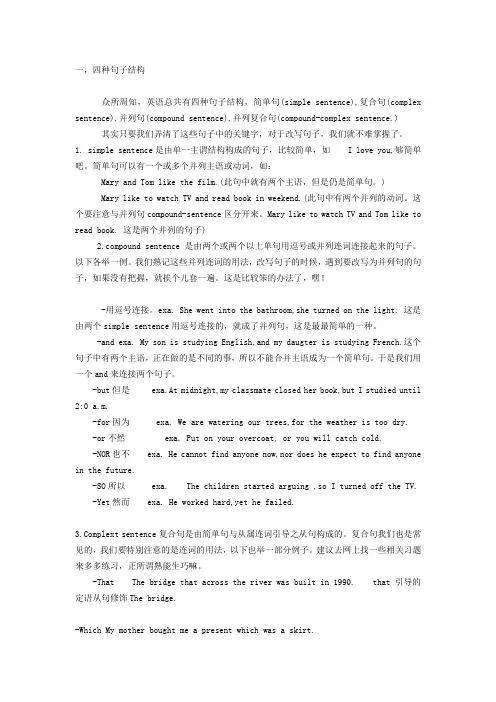
一,四种句子结构众所周知,英语总共有四种句子结构,简单句(simple sentence),复合句(complex sentence),并列句(compound sentence),并列复合句(compound-complex sentence.) 其实只要我们弄清了这些句子中的关键字,对于改写句子,我们就不难掌握了。
1. simple sentence是由单一主谓结构构成的句子,比较简单,如 I love you,够简单吧。
简单句可以有一个或多个并列主语或动词,如:Mary and Tom like the film.(此句中就有两个主语,但是仍是简单句。
)Mary like to watch TV and read book in weekend.(此句中有两个并列的动词。
这个要注意与并列句compound-sentence区分开来。
Mary like to watch TV and Tom like to read book. 这是两个并列的句子)pound sentence是由两个或两个以上单句用逗号或并列连词连接起来的句子。
以下各举一例。
我们熟记这些并列连词的用法,改写句子的时候,遇到要改写为并列句的句子,如果没有把握,就挨个儿套一遍。
这是比较笨的办法了,嘿!-用逗号连接。
exa. She went into the bathroom,she turned on the light. 这是由两个simple sentence用逗号连接的,就成了并列句,这是最最简单的一种。
-and exa. My son is studying English,and my daugter is studying French.这个句子中有两个主语,正在做的是不同的事,所以不能合并主语成为一个简单句。
于是我们用一个and来连接两个句子。
-but但是 exa.At midnight,my classmate closed her book,but I studied until 2:0 a.m.-for因为 exa. We are watering our trees,for the weather is too dry.-or不然 exa. Put on your overcoat, or you will catch cold.-NOR也不 exa. He cannot find anyone now,nor does he expect to find anyone in the future.-SO所以 exa. The children started arguing ,so I turned off the TV.-Yet然而 exa. He worked hard,yet he failed.plext sentence复合句是由简单句与从属连词引导之从句构成的。
并列句与复合句的区别在英语语法中,并列句(Compound Sentences)和复合句(Complex Sentences)是两种常见的句子结构。
尽管它们都由多个句子组成,但它们在句子的组织和表达方式上存在一些明显的区别。
本文将详细介绍并列句和复合句的区别。
并列句是由两个或更多具有相等地位的句子组成的句子结构。
这些句子之间使用逗号、分号或连词连接。
并列句的目的是将几个相关的句子放在一起,以便更清晰地表达意思。
并列句的每个句子都可以独立存在,其地位相等,不会因为连接词的使用而改变。
例如:1. 我喜欢游泳,我也喜欢跑步。
2. 她很聪明,努力学习,因此成绩很好。
在这些例子中,每个并列句都由两个句子组成,这些句子之间使用了连词(如"和"、"或"、"但")或逗号进行连接。
每个句子在结构和地位上是平等且独立的。
并列句的使用可以使句子更加简明扼要,并且可以清楚地表达多个相关观点或事实。
与此相反,复合句由一个主句和一个或多个从句(Subordinate Clauses)构成。
主句是一个完整的句子,而从句则不能独立存在,它依赖于主句来提供完整的意义。
复合句使用从属连词或关系代词来连接主句和从句。
例如:1. 我去了图书馆,因为我需要借一本书。
2. 她明天要去旅行,所以今天她很忙。
在这些例子中,主句为"我去了图书馆"和"她明天要去旅行",从句为"因为我需要借一本书"和"所以今天她很忙"。
从句在句子结构和内容上都依赖于主句,从而形成了复合句。
复合句的使用可以通过提供进一步的解释、原因、条件或结果等来拓展和详细说明主句的内容。
总的来说,并列句和复合句的区别在于句子内部成分之间的关系及其地位。
并列句中的句子地位平等,每个句子都可以独立成立,而复合句则由一个主句和一个或多个从句组成,主从句之间存在从属关系。
sentence的用法总结大全sentence有句子,宣判的意思。
那你们想知道sentence的用法吗?今天给大家带来了sentence的用法,希望能够帮助到大家,一起来学习吧。
sentence的用法总结大全sentence的意思n. 句子,宣判vt. 宣判,判决变形:过去式: sentenced; 现在分词:sentencing; 过去分词:sentenced;sentence用法sentence可以用作动词sentence的基本意思是“宣判,判决”,一般指法庭在审判之后决定和宣布对某人进行惩罚,用作及物动词,接名词或代词作宾语,还可接以动词不定式充当宾语补足语的复合宾语。
sentence常用于被动结构,并常与介词to连用。
sentence与for连用,意为“因…而判处”; 与to连用意为“判处…”。
sentence用作动词的用法例句He has been sentenced to pay a fine of 1000 pounds.他被判罚款1000英镑。
He was sentenced to death.他被处以死刑。
sentence可以用作名词sentence的基本意思是“判决,宣判”,指的是由法官或执法者颁布的一道命令,旨在惩罚某些罪犯。
sentence还可指语法中的“句子”,一般由若干个单词组成,首字母要大写。
作此解时是可数名词。
sentence用作名词的用法例句It is a fact that I have written this sentence.我写了这个句子是事实。
The judge will pass sentence tomorrow after looking at the report.法官看完报告后明天会做出判决。
He has been sentenced to pay a fine of 1000 pounds.他被判罚款1000英镑。
sentence用法例句1、He stood emotionless as he heard the judge pass sentence.他面无表情地站在那里,听法官宣布判决。
简单句复合句和复杂句的区别语法是语言学的一个重要分支,它用于研究句子的结构和规则。
在语法中,句子的类型可以分为简单句、复合句和复杂句。
本文将讨论这三种句子类型的区别。
一、简单句简单句是由一个主谓结构构成的句子,它只包含一个独立的主语和谓语。
简单句通常表达一个完整的含义,但有时也可以省略主语或谓语。
以下是一些简单句的例子:1. 我喜欢篮球。
2. 他在图书馆学习。
3. 她刚才给我发了一条信息。
这些句子都是由一个主语和谓语构成,表达了一个简单的意思。
二、复合句复合句由一个或多个从属句和一个主句组成。
从属句可以是名词性从句、形容词性从句或副词性从句,而主句则是整个句子的核心。
以下是一些复合句的例子:1. 她告诉我,她会来参加聚会。
(名词性从句)2. 我遇到了一个很好笑的人,他讲了很多笑话。
(形容词性从句)3. 我将在明天去超市,因为我需要买些食物。
(副词性从句)在这些例子中,从属句提供了额外的信息,而主句则用来表达主要的观点或意思。
三、复杂句复杂句是由一个主句和至少一个从属句组成的句子。
不同于复合句,复杂句中的从属句通常是副词性从句,用来修饰主句中的动词、形容词或副词。
以下是一些复杂句的例子:1. 因为她感冒了,所以她没有去上学。
2. 他告诉我,他喜欢读书的地方。
3. 尽管下雨了,他还是出去跑步了。
这些例子中的从属句提供了条件、原因或对比等信息,帮助我们更好地理解主句中的内容。
综上所述,简单句、复合句和复杂句在结构和用法上都有一定的区别。
简单句由一个主谓结构构成,表达一个完整的含义;复合句由一个主句和一个或多个从属句构成,从属句可以是名词性、形容词性或副词性;而复杂句则是由一个主句和至少一个副词性从句组成,用来修饰主句中的动词、形容词或副词。
理解这些区别有助于我们在写作和交流中更准确地表达自己的意思。
Compound sentence 和complex sentence的区别并列句(Compound Sentence)并列句有两个或两个以上的主谓结构。
这些主谓结构之间的关系是并列的、对等的。
从语法上讲,所谓"并列"、"对等"是指任何一个主谓结构都能独立地表达意思,谁也不从属于谁。
尽管如此,这些主谓结构在意思或逻辑上有一定程度的内在联系。
否则,它们就可能被分别写成简单句,而没有必要写在一起构成并列句了。
在并列句中,要使两个或几个主谓结构(或者说,分句)连接在一起,就要用并列连词。
并列连词用来连接平行对等(即互不从属)的分句。
按其表示的不同意思有下面几种:A. 表示转折意思 : but , yet , however , nevertheless例:Everything in the world is outside you but health belongs to yourself . 一切都是身外之物,只用健康属于自己。
B.表示因果关系: or , so , therefore , hence例:You'd better take an umbrella with you, for it's going to rain. 要下雨了,你最好带把伞。
C.表示并列关系and , or , either…or , neither / nor , not only…but (also), both…and , as well as例:She came to my house yesterday evening, and I went to hers . 昨晚她来我家了,我却去她家了。
复合句(Complex Sentence)复合句明显地不同于简单句,因为它有两个或两个以上的主谓结构。
从表面上看,它与并列句相似。
其实不然,后者的几个主谓结构之间的关系是并列的、对等的;而复合句中的主谓结构之间的关系不是并列的、对等的,其中只有一个主谓结构是主要的,其他的主谓结构都从属于那个主要的主谓结构。
那个主要的主谓结构称作句子的主句(Main Clause);其他的主谓结构称作句子的从句或子句(Subordinate Clause)。
复合句里的从句种类较多,引起不同的从句要用不同的从属连词。
关于从属连词的具体使用将在"从句"的有关章节里再作介绍。
另外,这里所说的"从属"关系,是指从句只有和主句在一起才能有意义;从句若从主句那里独立出来就无法表达意义了。
请看下列句子:Because they talk at home while the television is on , many people think they can talk at moviesas well . (状语从句)许多人在家里是边看电视边谈话,所以他们认为在电影院也可以如此。
如果将上面所有的从句都独立出来,那将是这样的:Because they talk at home while the television is on由于上面这个句子既不是陈述句,也不是疑问句,所以它无法独立地表达意思。
这种情况就是与并列句的区别所在。
如前面两个这样的并列句:Do it this way or you'll be in trouble.Either you tell him the truth , or I do it .如果我们去掉这两句中的并列连词,它们就成了四个能独立表达意思的单句了:Do it this wayyou'll be in troubleyou tell him the truthI do it撇开首字母大小写和标点符号问题,从表达意义的角度讲,这四个句子是可以成立的。
从上述的分析,我们还可以悟出这样的道理:一、并列句中的并列连词纯粹似"粘合济",去掉后,被粘合的部分就分开独立了;而复合句中的从属连词则象一把"固定锁头",锁头与其所在的部分是不可以分开的。
二、从句其实是用来担当句子成分(除谓语外)的主谓结构,它的标志就是它句首的"锁头"--从属关系词。
那么,我们在阅读时,凡是看到某个句子以关系词开头,就可大胆地断定这个句子不是主句,而只是句中的某个成分。
这样做对提高我们的阅读能力是大有好处的。
英语写作句子结构常见错误类型•修饰语错位(Misplaced Modifiers)不一致(Disagreements)句子不完整(Sentence Fragments)词性误用(Misuse of Parts of Speech)悬垂修饰语(Dangling Modifiers)措词毛病(Troubles in Diction)不间断句子(串句)(Run-on Sentences)指代不清(Ambiguous Reference of Pronouns)累赘(Redundancy)不连贯(Incoherence)综合性语言错误(Comprehensive Misusage)一、不一致(Disagreements)•所谓不一致不光指主谓不一致,它还包括了数的不一致时态不一致及代词不一致等。
•例1. When one have money ,he can do what he want to . (人一旦有了钱,他就能想干什么就干什么。
)剖析:one是单数第三人称,因而本句的have应改为has ;同理,want应改为wants.本句是典型的主谓不一致。
改为: Once one has money ,he can do what he wants (to do)二、修饰语错位(Misplaced Modifiers)•英语与汉语不同,同一个修饰语置于句子不同的位置,句子的含义可能引起变化。
对于这一点中国学生往往没有引起足够的重视,因而造成了不必要的误解。
•例 1. I believe I can do it well and I will better know the world outside the campus. 剖析:better位置不当,应置于句末。
三、句子不完整(Sentence Fragments)•在口语中,交际双方可借助手势语气上下文等,不完整的句子完全可以被理解。
可是书面语就不同了,句子结构不完整会令意思表达不清,这种情况常常发生在主句写完以后,笔者又想加些补充说明时发生。
•例1. There are many ways to know the society. For example by TV ,radio ,newspaper and so on . 剖析:本句后半部分”for example by TV ,radio ,newspaper and so on .“不是一个完整的句子,仅为一些不连贯的词语,不能独立成句。
改为:There are many ways to know society ,for example ,by TV ,radio ,and newspaper.四、悬垂修饰语(Dangling Modifiers)•所谓悬垂修饰语是指句首的短语与后面句子的逻辑关系混乱不清。
•例如:At the age of ten, my grandfather died. 这句中”at the age of ten”只点出十岁时,但没有说明“ 谁”十岁时。
按一般推理不可能是my grandfather,如果我们把这个悬垂修饰语改明确一点,全句就不那么费解了。
改为:When I was ten, my grandfather died.•例1. To do well in college, good grades are essential. 剖析:句中不定式短语“to do well in college” 的逻辑主语不清楚。
改为: To do well in college, a student needs good grades.五、词性误用(Misuse of Parts of Speech)“词性误用”常表现为:介词当动词用;形容词当副词用;名词当动词用等。
例1. None can negative the importance of money. 剖析:negative 系形容词,误作动词。
改为: None can deny the importance of money.六、指代不清(Ambiguous Reference of Pronouns)•指代不清主要讲的是代词与被指代的人或物关系不清,或者先后所用的代词不一致。
试看下面这一句: Mary was friendly to my sister because she wanted her to be her bridesmaid. (玛丽和我姐姐很要好,因为她要她做她的伴娘。
)读完上面这一句话,读者无法明确地判断两位姑娘中谁将结婚,谁将当伴娘。
如果我们把易于引起误解的代词的所指对象加以明确,意思就一目了然了。
这个句子可改为:Mary was friendly to my sister because she wanted my sister to be her bridesmaid. 例1. And we can also know the society by serving it yourself. 剖析:句中人称代词we 和反身代词yourself指代不一致。
改为: We can also know society by serving it ourselves.七、不间断句子(Run-on Sentences)什么叫run-on sentence?请看下面的例句。
例1. There are many ways we get to know the outside world. 剖析:这个句子包含了两层完整的意思:“There are many ways.” 以及“We get to know the outside world.”。
简单地把它们连在一起就不妥当了。
改为: There are many ways for us to learn about the outside world. 或: There are many ways through which we can become acquainted with the outside world八、措词毛病(Troubles in Diction)• Diction 是指在特定的句子中如何适当地选用词语的问题,囿于教学时间紧迫,教师平时在这方面花的时间往往极其有限,影响了学生在写作中没有养成良好的推敲,斟酌的习惯。